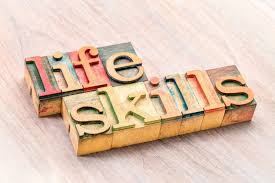IMPORTANCE OF LIFE SKILLS
PROMOTION OF LIFE SKILLS
1. What is a life skill?
Life skill is the ability of an individual to apply mental and physical abilities in society to control his/her environment or situations.
OR
Life skills are social and personal useful methods which give an individual knowledge and the ability to deal confidently with his or her daily activities in life.
2. It involves things like thinking, planning and implementation so as to solve life problems like poverty, diseases and corruption.
TYPES OF LIFE SKILLS
Some of the types of life skills are;
(i) Skills of knowing and living with oneself
(ii) Skills of knowing and living with others
(iii) Skills of making effective decisions
(iv) Communication skills
1. Skills of Knowing and Living with oneself
I. Self Awareness Skills – Is the ability of an individual to know and understand his/her feelings, strengths, weaknesses and position in the society.
Importance of Self Awareness Skill
i. It builds confidence.
ii. It helps one to make better choices.
iii. It promotes individual development.
II. Self Esteem Skills – Is the ability of a person to appreciate oneself. It includes appreciating personal aspects like appearance, abilities and hehaviour.
Importance of Self Esteem Skills
i. It helps to build self confidence.
ii. It helps a person to respond confidently to any situations of life.
iii. It promotes individual development.
III. Assertiveness – Is the ability of a person to know what he wants and why.
– It also means being able to take the necessary steps to get what one wants.
– It is also the ability to respond confidently to any situation. For example a girl rejecting sexual proposal from an older man.
– Assertive is the opposite of passivity.
– Passivity is the situation of accepting everything without rejecting or challenging it.
IV. Problem Solving – It involves making a choice and acting on it with minimum harm and maximum advantage.
V. Coping with emotions – Is the ability of a person to understand and control his/her emotions.
– Emotions are strong feelings such as fear, love, anger and shyness.
– Emotions may lead to actions that are not based on logical reasoning.
Therefore they can cause a person to regret later.
Ways of coping with emotions
i. Accept the reality.
ii. Find various alternatives of solving problems.
iii. Think over situations positively. Carry out your actions step by step.
iv. Seek advice when necessary.
VI. Coping with Stress – Stress is a mental, emotional or physical tension or pressure.
Causes of stress may be:-
i. Family problems.
ii. Examination pressure.
iii. Broken relationships.
iv. Death of family member or friend.
2. Skills of Knowing and Living with Others
VII. Building positive relations with other people. (Interpersonal Relationships) – Is the ability for the people to meet and relate with others in various places such as schools and social gatherings.
VIII. Friendship Formation – It is important because a person needs friends to share some aspects of life such as hopes, fears and ambitions.
We should be able to recognise good and bad friends in life.
IX. Empathy – Is the ability of putting oneself in other people’s mood especially when they are faced with serious problems. It means to share the burden of others and not to condemn them. OR Empathy is the ability of putting oneself in other peoples’ shoes
X. Peer Resistance – Is the ability to maintain position regardless pull from friends.
3. The skills of making effective decisions
XI. Critical Thinking – Is the skill that makes people think and reason out before making any decision. It assists an individual to list down alternatives and analyse each alternative .If merits overwhelm demerits then the decision is good.
XII. Creative thinking skills – Is the ability of coming up with new things and even producing new ideas. It helps a person to face the challenges of life and make appropriate decisions.
XIII. Decision making. This is the ability to make a choice out of many options that are available after knowing the consequences of the choice.
4. Communication Skills
Communication includes four skills which are:-
i. Listening skills
ii. Speaking skills
iii. Reading skills
iv. Writing skills
I. Listening Skills – Is the situation of paying attention to a message delivered.
Listening skills help a person to understand what has been presented by the speaker.
– It also develops the reasoning and questioning skills.
II. Speaking Skills – It is the art of expressing thoughts by talking.
It helps to give ideas on something to other people.
III. Reading Skills – Reading is the process of looking at letters or prints to gain ideas.
There are several ways of reading such as:-
a. Scanning – reading by looking for specific information like names and dates.
b. Skimming – reading by looking for main ideas.
c. Intensive reading – reading for understanding and remembering.
– Reading helps a person to extend knowledge
IV. Writing Skills – Is the making of meaningful letters or prints on a given medium like paper and board.
– A person should be conversant with different forms of presentation that make a good writing such as use of topics, paragraphs and punctuation marks.
SOURCES OF LIFE SKILLS

1. What is a source of life skills?
Is a place where people can get the required skills. It also means people who can impart life skills into lives of others.
OR
Is a person who is responsible to impart skills to others.
The following are important sources of skills.
I. Parents
Parents are responsible to teach their children good manners so as to be accepted in the society.
II. Religion
Religion is the belief in existence of God or gods.
Religion teachings help a person to distinguish between good and bad deeds.
III. Schools
In school people learn different life skills through different subjects.
– Such skills add and expand their knowledge.
IV. Government
The government is also important in imparting life skills to people through its ministries, institutions like colleges and social welfare offices.
V. Non – governmental Organisations (NGOs)
There are different NGOs that promote our life skills in one way or another. For instance, there are NGOs which teach the youth different skills like how to fight drug abuse, HIV/AIDS and how to be self reliant.
Examples of NGOs found in Tanzania are Hakielimu, Tanzania Gender Networking Programme (TGNP), TAMWA and Plan International.
IMPORTANCE OF LIFE SKILLS
1. Life skills build confidence to individuals.
2. Life skills help to solve social problems like poverty, corruption and diseases.
3. Life skills help us to think critically.
4. Life skills help us to improve performance in school.
5. Life skills help people to explore alternatives and enables a person to weigh merits and demerits of choices.
6. It helps the youth to face the challenges of life positively.
7. It builds and promotes positive social relations.
8. It helps people to avoid risky behaviours like prostitution, drug abuse and drunkardness .
CONSEQUENCES OF NOT APPLYING LIFE SKILLS
1. Inability of the youth to solve problems.
2. Retardation of self awareness and self esteem.
3. Spread of diseases like HIV/AIDS.
4. The youth will fail to reach their expected goals.
5. It can lead to improper behaviour and indiscipline.
6. Increases the rate poverty and dependence in the society.
7. Moral decay.
























































